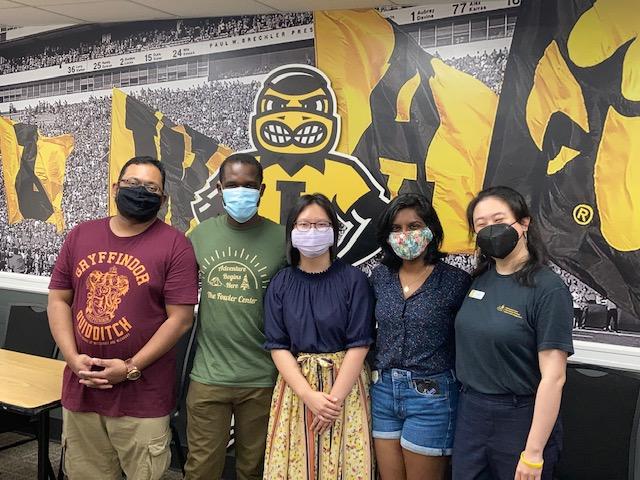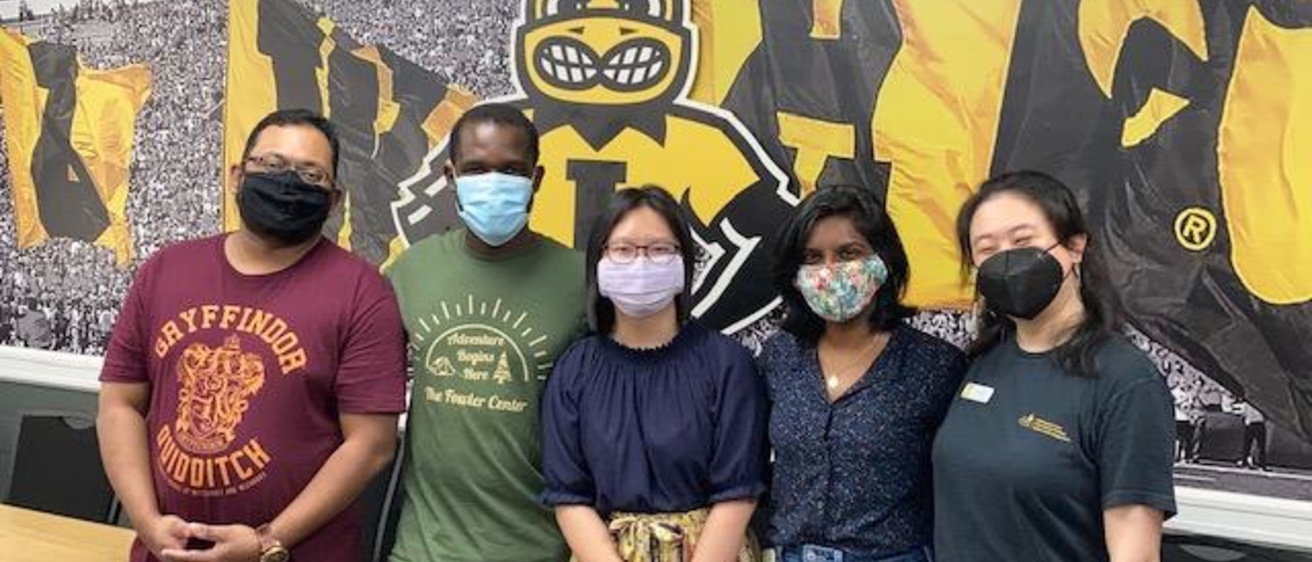International students and scholars recently had an opportunity to learn about campus involvement from current and former leadership team members of the International Student Advisory Board (ISAB). Sponsored by International Student Support & Engagement (ISSE) and International Student & Scholar Services (ISSS), the event was held on Friday, August 27, and featured four panel members—each with significant leadership experience in campus student organizations. Shuhui Lin, International Student Support and Engagement Coordinator, moderated the panel.
- Redwan Bin Abdul Baten, PhD student in health services and policy (former graduate co-chair of ISAB)
- Frankline Matanji, PhD student in journalism and mass communication (current graduate communication director of ISAB)
- Siau-Tong Ding, undergraduate student in anthropology and environmental policy and planning (former undergraduate secretary of ISAB; current undergraduate board member of ISAB)
- Mishma Nixon, undergraduate student in English and creative writing (former undergraduate chair of ISAB; current undergraduate board member of ISAB)

From left to right: Redwan Bin Abdul Baten, Frankline Matanji, Siau-Tong Ding, Mishma Nixon, Shuhui Lin
Event participants were able to join the panel discussion in person or virtually via Zoom.
Panel members fielded a variety of questions about how and why to get involved on campus as well as inquiries about their personal involvement on campus.
Several themes emerged from the discussion.
Myriad of benefits
When asked what motivated them to get involved on campus, panel members had wide-ranging answers, but there was agreement that involvement in student organizations yields real benefits, including making new friends, gaining a sense of community, building new skills, and learning about your field of study from another perspective such as research, work, or student organizations related to your major.
Benefits cited also included self-exploration. “Getting involved on campus made me more clear about not just my professional goals, but my personal goals and values, as well,” said Siau-Tong “Tong” Ding.
The opportunity to serve others was another commonly-cited benefit. “I have received so much from the University of Iowa and the Iowa City community,” said Redwan Bin Abdul Baten. “I wanted to give back in any way that I could, including advocacy work through student organizations.”
Safe environment to learn and grow
Panel members agreed that student organizations provide a safe environment in which to learn and grow. Frankline Matanji commented, “Before getting involved, I was afraid of failure. Over time, I learned that you don’t have to get scared about joining new organizations because you fear that you aren’t good at something. You always have other people around to help you.”
Redwan said that he also had some fear about leadership positions in student organizations, but that he moved beyond that fear of failure to find his voice. “You sometimes make incorrect decisions. Things won’t always be perfect. You only learn by getting involved and having new experiences.”
Mishma Nixon noted the opportunity to experiment with interests, saying, “By trying new things you realize what you can accomplish.” She went on to describe how she learned to work as a part of team. “When I first came to college, I wanted to do everything on my own. If something wasn’t getting done, I would do it. I realized that it’s better to slow down to work as a team in order to gain multiple viewpoints and involvement from others.”
Time management and balance is important
The importance of balance and time management was stressed by panel members. Several utilize calendars not only to plan their time and mark important engagements, but also to ensure balance between the various areas and priorities in their lives.
As a spouse and parent, Redwan spoke to the importance of building in time for his family. “I use my calendar to maintain some sort of discipline in my life and to organize my important meetings and events around my family life.”
Tong also relies on a calendar, saying, “Having both study time and the other things that interest me mapped out on my calendar makes me more motivated to stick to my schedule because it is balanced.”
Mishma finds that the busier her schedule is, the more she gets done. She also encourages balance between academics, involvement in student organizations, and outside hobbies. “It’s easy to live-and-breathe your extra-curriculars, but you should also form boundaries. Have other fun things you like to do.”
Advice from panel members
Event participants were encouraged to use student organizations to explore their interests and discover their passions.
“It’s good to explore, see what your potential is, and get involved with what you are passionate about,” said Tong, but she also cautioned about stretching yourself too thin. “You don’t have to do everything or get involved with everything. Your body won’t tolerate it.”
Frankline advises getting involved early, saying, “I know that as students we are very busy, but engaging on campus gives you so many opportunities, including meeting new friends from other cultures.”
